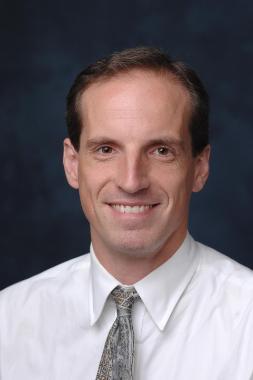April 13, 2020
Evan Anderson ’95 is working to test a COVID-19 vaccine candidate as quickly and safely as possible.
 Like many other medical professionals, Dr. Evan Anderson ’95 is working long hours and setting aside regular projects in light of the COVID-19 pandemic.
Like many other medical professionals, Dr. Evan Anderson ’95 is working long hours and setting aside regular projects in light of the COVID-19 pandemic.
But for Anderson, a medical doctor and Associate Professor of Pediatrics and Medicine at Emory University School of Medicine and Children’s Healthcare of Atlanta, the “front lines” are testing this vaccine in volunteers.
He is the Emory principal investigator on a clinical trial to determine whether a newly developed vaccine for COVID-19 is safe and results in an immune response. The clinical trial started March 16, just days after President Trump declared a national emergency.
Anderson, an infectious disease specialist, leads a team from Emory’s Vaccine and Treatment Evaluation Unit (VTEU) which has performed trials on vaccines during the 2009 H1N1 pandemic and the Ebola epidemic.
The trial vaccine, called mRNA-1273, was developed by the National Institute of Allergy and Infectious Diseases (NAID), an institute of the National Institutes of Health (NIH), and the biotechnology company Moderna, Inc. It incorporates knowledge gained in previous studies of Severe Acute Respiratory Syndrome (SARS) and Middle East Respiratory Syndrome (MERS), which are also caused by coronaviruses.
“It’s a tremendous privilege to have the opportunity to be involved with this COVID-19 vaccine,” Anderson said. “In the midst of this pandemic, we’re trying to move the vaccine forward through clinical trials as quickly as is safely possible.”
The NIH reached out to Emory to request that it join the study in mid-March. Within about two weeks of the request, Anderson and his team fulfilled regulatory requirements for enrolling clinical trial participants and had administered the first of two doses of the experimental vaccine.
For the first phase of the trial, Anderson and his team are interviewing participants and monitoring their bloodwork to observe reactions and immune responses to the vaccine. They will continue to do so for 12 months after the second dose is administered.
Future phases of the study would test the vaccine in larger groups of participants at additional sites across the country. It will need to be safe and effective in later phase clinical trials before it could be FDA licensed and available for prevention of COVID-19.
Anderson says that studying Chemistry at Wheaton and putting in long hours of manual labor at HoneyRock Outdoor Center for Leadership Development as part of the work crew gave him a strong foundation for medical school at the University of Chicago and for this pivotal moment in his career.
“There was nothing more intellectually challenging than P-Chem [Physical Chemistry] at Wheaton College,” he says. “I’m very thankful for the excellent education I received at Wheaton. It taught me how to think critically, and this skill has been very useful throughout my career.” --Emily Bratcher
Photo courtesy of Emory University.